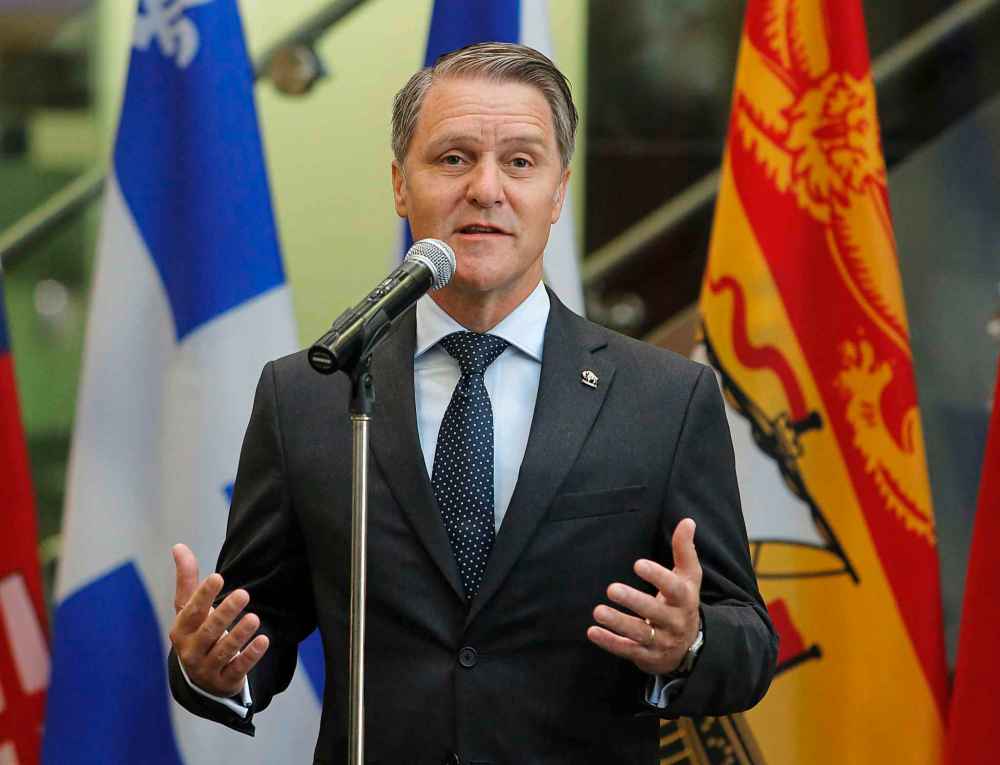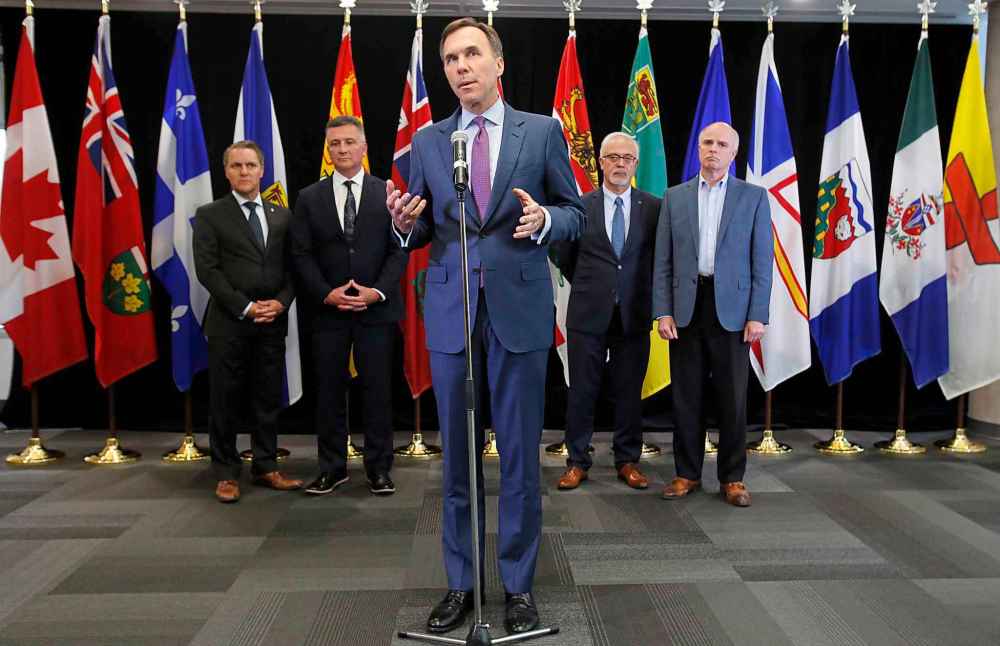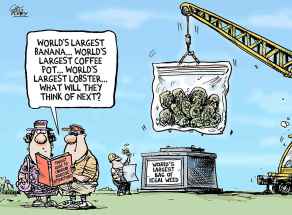Manitoba voices concern over federal tax reform
Read this article for free:
or
Already have an account? Log in here »
To continue reading, please subscribe:
Monthly Digital Subscription
$0 for the first 4 weeks*
- Enjoy unlimited reading on winnipegfreepress.com
- Read the E-Edition, our digital replica newspaper
- Access News Break, our award-winning app
- Play interactive puzzles
*No charge for 4 weeks then price increases to the regular rate of $19.00 plus GST every four weeks. Offer available to new and qualified returning subscribers only. Cancel any time.
Monthly Digital Subscription
$4.75/week*
- Enjoy unlimited reading on winnipegfreepress.com
- Read the E-Edition, our digital replica newspaper
- Access News Break, our award-winning app
- Play interactive puzzles
*Billed as $19 plus GST every four weeks. Cancel any time.
To continue reading, please subscribe:
Add Free Press access to your Brandon Sun subscription for only an additional
$1 for the first 4 weeks*
*Your next subscription payment will increase by $1.00 and you will be charged $16.99 plus GST for four weeks. After four weeks, your payment will increase to $23.99 plus GST every four weeks.
Read unlimited articles for free today:
or
Already have an account? Log in here »
Hey there, time traveller!
This article was published 26/06/2018 (2725 days ago), so information in it may no longer be current.
OTTAWA — Manitoba Finance Minister Cameron Friesen says the federal Liberals’ controversial business-tax changes are headed for another flare-up, in part over confusion about whether the province will have to pay out high-income owners if it opts out of the federal reform.
“I believe in many respects we could be, right now, in the eye of a storm,” Friesen said Tuesday, on the sidelines of a twice-annual meeting with provincial and federal counterparts.
Last summer, federal Finance Minister Bill Morneau sparked controversy over a tax reform meant to close what his government says are loopholes high-income Canadians use to avoid paying a fair share.

The Liberals walked back their reform after the Opposition claimed they’d characterized doctors and small-business owners feel like tax cheats over practices such as “income sprinkling.”
But they are still planning to change tax rules to restricts small business’ ability to claim a deduction when its passive-investment income exceeds $50,000. The idea is to remove an incentive for individual Canadians to form corporations solely so they pay different tax rates; the government estimates it will add $2.3 billion in tax revenue over five years.
The Liberals say this will only apply to the top three per cent of the wealthiest incorporated individuals, however, Friesen says it puts an “unfair, additional” burden on small-business owners.
“We continue to be concerned about tax fairness for small corporations,” said Friesen, warning there could be more public outcry about the policy.
Provinces can opt out of the change, something the Canadian Federation of Independent Business has been pushing ministers to do. Both Manitoba and Saskatchewan are considering the action, but neither know what will happen if they do.
“What we’ve discovered is there would be an impact, a negative impact in our jurisdictions on dividend tax credits, as a result,” Friesen said, referring to a provincial tax credit paid from corporate earnings that have already been taxed.
Friesen suggested it’s possible the two tax policies won’t be integrated, and thus the province will overcompensate Manitobans who claim dividends. That would mean providing another tax advantage through a separate mechanism — but this time, it would come out of provincial coffers instead of the federal purse.
Friesen said he “did not have clarifications” Tuesday from Ottawa on how the two policies align, “but we did have an indication, a signal by the federal government, that they will continue to interact with us on this question.”
In a statement, Finance Canada wrote that opting out of the change “would mean that the amount of income eligible for the small business tax rate could be higher for provincial/territorial tax purposes” because the federal taxation limit would change for small businesses, but not the Manitoba one.
“Finance officials have been working with provincial and territorial officials to explain the implications for their respective jurisdiction of following or not the new federal rules,” the department wrote.
Friesen said the ministers also touched on equalization payments, after a last-ditch effort by Alberta, Saskatchewan, and Newfoundland and Labrador to rewrite the existing formula, which Parliament last week extended for another five years, through to 2024.
The formula has Ottawa decide how much of a $19-billion transfer to give each province based on population and capacity to generate taxes, with the aim of ensuring comparable living standards. That favours the Maritimes and Quebec, but freezes out payments to oil-rich provinces that continue to have strong economies, despite rising unemployment.
Friesen said his government says the current system works, for the most part, well, adding he would have preferred a change that would have had included non-residential property values in the complex calculation that decides equalization. (Currently, only homes are counted in the math.)

That idea would likely leave Ontario and British Columbia with less revenue. Finance ministers discussed the proposal at their last meeting in December, but Friesen said that discussion will have to take place when the formula is revisited for 2024 onwards.
“It’s based on evidence; it was met with approval,” Friesen said. “We’re disappointed we can’t adopt that yet.”
The focus of Tuesday’s meeting was the rise of protectionism in the United States, including the ongoing renegotiation of the North American Free Trade Agreement and U.S. tariffs of steel and aluminum. Canada’s ambassador to the U.S. and business leaders briefed the provincial ministers on both issues, including the retaliatory levies Canada will impose on many American products, starting July 1.
Morneau was mum when challenged by reporters about Canadian companies that worry about an escalating trade war, or having to pay those retaliatory tariffs themselves. Reporters cited a manufacturing company whose supply chain requires products to bounce across the border three times during production, thus incurring tariffs each time.
“We do need to strand strong; we need to show resolve, to demonstrate to the Americans that we absolutely believe that these tariffs that they’ve put on us are not appropriate,” Morneau told reporters.
Provincial ministers showed a united front on Canada’s decision to implement its own tariffs, and Friesen said Manitoba was “well-represented, in terms of Manitoba’s interests at that table.”
In light of the uncertainty with U.S. trade, Friesen raised the need to break down interprovincial trade barriers, which includes laws and regulations. Manitoba Premier Brian Pallister has said this will be his main rallying point when the premiers meet this summer in New Brunswick.
Morneau seemed to agree. “There’s no better time for us to think about how we can work together more constructively than when we’re faced with an external challenge,” he told reporters.
A news release from Morneau’s office said the ministers had “also agreed to improve information availability on who owns which corporations in Canada” in the fight against tax evasion and money laundering, though none spoke about this effort during their 13-minute news conference.
dylan.robertson@freepress.mb.ca










